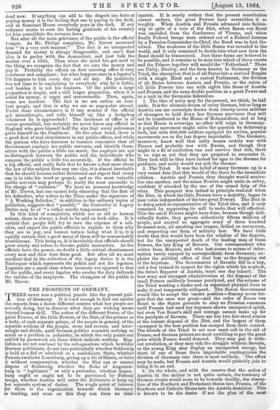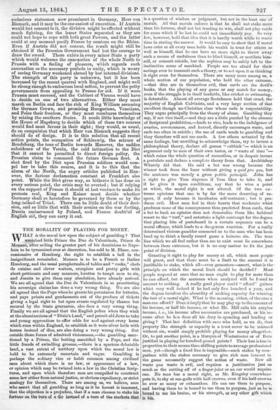THE PROSPECTS OF GERMANY.
THERE never was a political puzzle like the present posi- tion of Germany. It is hard enough to find out amidst the reports from a dozen different centres what her people are actually doing, but to discover what they are wishing seems beyond human skill. The action of the different States, of the great Powers, of the little Powers, of the Diet, of the princes as a body, of each separate prince, of the people in general, of the separate sections of the people, cross and recross, and inter- mingle and divide, until German politics resemble nothing so much as a problem in palmistry, in which the only points not settled by guesswork are those which indicate nothing. Eng- lishmen are not confused by the sub-questions which bewilder German politicians, do not care particularly whether Schleswig is held as a fief or admitted as a confederate State, whether Prussia swallows Lauenburg, giving up a bit of Silesia, or bolts it without compensation, whether the Diet can or cannot dispose of Schleswig, whether the Duke of Augusten- burg is " legitimate " or only a pretender, whether Lauen- burg ought or, ought not to be garrisoned by Federal troops, whether Austria will enter the Zollverein or keep up her separate system of duties. The single point of interest for them is the organization towards which Germany is tending, and even on this they can form no clear
opinion. It is nearly certain that the present constitution cannot endure, the great Powers have overridden it so roughly. When Austria and Prussia advanced into Schles- wig in spite of a vote of the Diet, when Baron von Bengt was excluded from the Conference of Vienna, and when finally Federal troops were ordered out of a Federal fortress by a Prussian Commander-in-Chief, the Band was in fact dis- solved. The weakness of the little States was revealed to the world, and it only remained to decide into what new form the Bund should be transmuted. Just three forms are believed to be possible, and it remains to be seen into which of them events and the Princes together will mould the "Fatherland." These are Unity, Duality, and the form known in Germany as the Triad, the absorption that is of all States into a revived Empire
with a single Head and a central Parliament, the division of all States between Austria and Prussia, or the union of all little Powers into one with rights like those of Austria and Prussia, and the same double position as a great Power and as a unit in the Germanic federation.
1. The idea of unity may for the present, we think, be laid aside. It is the ultimate dream of every German, but so long as
Austria can use conscripts drawn from twenty-seven millions of strangers to hold down her German provinces they will not be transferred to the House of Hohenzollern; and so long as that House is sovereign no other will reign in Germany. A. popular movement might solve the question by dethroning both, but with 850,000 soldiers equipped for service, popular movements are to the last degree improbable. The Germans, moreover, know well that unity means certain war with France and probable war with Russia, and though they might in a fit of exaltation run and survive that risk, there is no sign as yet that they are prepared to encounter it. They look still as they have looked for ages to the thrones for guidance, and unity would not suit the thrones.
2. The Triad. It was the belief of many Germans up to a very recent date that this would of the three be theimmediate solution. Austria and Prussia they thought would neutra- lize one another, and the minor Powers might unite in safety, confident if attacked by the one of the armed help of the other. This prospect was indeed in principle realized when the Diet, in which the little Powers have a majority,' began to pass votes independent of the two great Powers. The Diet in so doing acted as representative of the Triad idea, and it only remained by supporting its will to make that will effective. This the small Powers might have done, because though indi- vidually feeble, they govern collectively fifteen millions of people, and control an aggregate army of three hundred thousand men, all speaking one tongue, drilled on one system, and respecting one form of military law. We have little doubt that this would have been the solution of the dispute, but for the unexpected death of the leading man of these Powers, the late King of Bavaria. Oar correspondent who writes from Munich, and who has access to means of infor- mation rarely enjoyed by correspondents from Germany, ex- plains the political effect of that loss as the dropping out of the keystone. The Government of Bavaria fell to a boy, and a boy trained in respect for the rights which his nephew, the future Emperor of Austria, must one day inherit. The best army and strongest administration at the disposal of the small Powers suddenly became paralyzed, and the scheme of the Triad wanting a leader and an organized physical force to make it real temporarily collapsed. The Saxon Government would like to accept the vacant position—Saxony never for- gets that she once was great—and the order of Baron von Benet to the Saxon generals to obey no Prussian summons until Prussia had used her bayonets shows unexpected spirit, but even Von Beust's skill and courage cannot make up for the paralysis of Bavaria. There are but two fair-sized armies at the instant disposal of the Diet, and the largest of them encamped in the best position has escaped from their control. The friends of the Triad to act now must call in the aid of France, and German princes are most unwilling to pay the great price whiCh France would demand. They may pay it with- out revolution, or they may risk the struggle without Bavaria, or the young king may display an unexpected energy, but short of one of those three improbable contingencies the division of Germany into three is most unlikely. The effort may be made, but Prussia and Austria would probably join to bring it to an end.
3. On the whole, and with the reserve that the action of Austria in the matter is not quite certain, the tendency of German events would seem to be towards duality, the absorp- tion of the Northern and Protestant States into Prussia, of the Southern and Catholic States into the Austria dominion. This is known to be the desire if not the plan 'of the moat audacious statesman now prominent in Gerniany, Herr von Bismark, and it may be the one easiest of execution. If Austria would but consent to it, the division might be effected without much fighting, for the lesser States separated as they are could not hope to cope with both great Powers, and the latter could at any moment pacify France by cessions on the Rhine. Even if Austria did not concur, the result might still be obtained if the Prussian Government had but the courage to draw the'sword. There exists in every minor State a party which would welcome the annexation of the whole North to Prussia with a feeling of pleasure, which regards such annexation as the necessary prelude to unity, which is weary of seeing Germany weakened abroad by her internal divisions. The strength of this party is unknown, but it has been increased by the recent quarrel with England, and might well be strong enough to embarrass local action, to prevent the petty governments from appealing to France for aid. If it were Prussia must succeed, and the Cabinet of Vienna would have to decide on one of two alternatives. Either they must march on Berlin and face the risk of King William assuming the German Crown, and promising Hungarians, Venetians, and Poles their freedom, or they must reimburse themselves by seizing the southern States. It needs little knowledge of the House of Hapsburg to decide which of these two courses would find most favour in their sight; they would, as usual, do on compulsion that which Herr von Bismark suggests they should do of design. It is to this solution that all recent action points, the occupation of Schleswig, the seizure of Rendsburg, the tone of Berlin towards Hanover, the sadden subsidence of the Verein, the cold intimation to the Diet that it cannot be permitted to direct foreign policy, the Prussian claim to command the future German fleet. A shot fared by the Diet upon Prussian soldiers would com- pel her to take this course, and it is to this that the alarm of the North, the angry articles published in Han- over, the furious declamation constant at Frankfort also point. While the Diet gives way, as hitherto it has done on every serious point, the crisis may be averted ; but if relying on the support of France it should at last venture to make its protests real, King and Kaiser must decide whether Germany shall as heretofore be governed by them or by the long-talked-of Triad. There can be little doubt of their deci- sion, and as little that with their armies on the war footing, Russia embarrassed by Poland, and France doubtful of English aid, they can carry it out.































 Previous page
Previous page